When It Comes to Spotting Fake Receipts, It’s A.I. vs. A.I.

© The New York Times

© The New York Times


© The New York Times

© Saher Alghorra for The New York Times

(德国之声中文网)由于中国中央电视台已经撤销了各合作伙伴对这段画面的使用许可,路透社等媒体在9月5日也撤除了相关视频。路透社称,中央电视台在致信路透社时表示,“对此类材料的编辑处理,明显歪曲了授权内容中的事实和陈述。”但是路透社则强调,“我们仔细审查了已发布的片段,没有发现任何理由相信路透社长期以来对准确、公正新闻报道的承诺受到了损害。”
当天央视的直播画面通过合作协议被实时传送给路透社等多家国际媒体,后者则将这段闲聊单独剪出并重新分发给各媒体。
在画面中,习近平和普京、金正恩正在天安门城楼上并肩行走准备阅兵观礼,而他们闲聊的声音则被中国央视意外录下。习近平和普京在翻译员的协助下,谈及长生不老的可能性。习近平先是通过翻译表示,过去超过70岁的人很少见;如今人们说,70岁还只是个孩子。普京随后说:“生物技术不断发展,人类器官会不断移植,越活越年轻,甚至可以长生不老。”习近平则回应说:“有人预测本世纪人类可能可以活到150岁。”
当天晚些时候,普京在召开新闻发布会时确认了这段闲聊内容。他说:“习近平主席谈到了这个话题。现代的健康改善手段、医疗手段、甚至包括器官移植在内的外科技术,都让人类有理由相信:未来的生活会和现在不同。各国的平均寿命不同,但人类的预期寿命将会大幅提升。”
中俄网民嘲讽火力全开
这段画面在中国国内的官方媒体播放时,现场原声都被音乐以及旁白遮盖。中国网民都是通过外媒方才了解到普京和习近平的闲聊内容。推特/X知名账号“李老师不是你老师”更是转发一则网友投稿称,9月3日,“150”词条的微信指数较前一天异常暴涨9650.24%,搜索量高达3368513次。但不论是微信,还是知乎、微博等其他中国国内社媒平台,这段闲聊内容均遭屏蔽。
习近平提到的“活到150岁”,也让不少网民联想到“981健康科技集团”。这家成立于2014年的北京企业,一度以“以首长保健团队为核心”、“几十年高端人士和首长领导医疗保健经验”为卖点。2019年,微信上更是一度疯传一则后来被删除的广告,称2005年启动的“981首长健康工程”延寿目标为150岁。
“李老师不是你老师”还转发一条抖音帖文:“他要是活150岁,那真得无间地狱了。”
在俄语的社媒平台上,两人的闲聊也引发了巨大回响。俄罗斯记者舒米林(Vadim Shumilin)讽刺地说:“届时脑子里会发生什么,完全不清楚。每天散步、晚间阅读外文的益智书刊,这些惯常手段也许有时有点用,但是并不能从根本上有所改观。人类的大脑衰老速度依然和几十年前甚至上百年前没什么两样。就目前而言,对长生不老的追求,似乎意味着地球即将被充满力气和热情的永远年轻的英雄、但是精神和秉性却像百岁老人的人所统治。老实说,这不是光明的前景。”
专栏作者德里瑟(Dmitri Drise)也反讽地说,“只有一个永恒的领袖才能保持国家的稳定。是时候让既往统治者的多年梦想成为现实了。”还有俄罗斯网民点评说,“不过就算彼得大帝多活300年,也总是会有人在30年内让他的毕生功业毁于一旦。”
DW中文有Instagram!欢迎搜寻dw.chinese,看更多深入浅出的图文与影音报道。
© 2025年德国之声版权声明:本文所有内容受到著作权法保护,如无德国之声特别授权,不得擅自使用。任何不当行为都将导致追偿,并受到刑事追究。
中国汽车工程研究院推出“智能驾驶金字塔分级测评体系”,首次对智能驾驶能力进行科学分级。
据中国央视新闻客户端消息,这一测评体基于技术成熟度,将智能驾驶划分为“安全基线”“综合优选”“极智拔尖”三个层级。
其中,安全基线层以法规符合性为核心,覆盖国内外标准测试,确保基础功能合规;综合优选层以“好用”为标准,通过封闭场地与开放道路双重测试,复现消费者日常典型场景,多维度筛选“优等生”;极智拔尖层则针对一些用车的复杂临界场景开展极限工况测试,量化系统拟人化决策能力。
据报道,专家称,这一测评体系由中国汽车工程研究院携手行业内14家单位联合研究共建,目前已在中国国内多家车企的产品开发中得到应用,共有上百款主流车型通过体系内相关测评,平均得分较三年前提升20%以上。
除了智驾测评体系,两项汽车智能测试技术路线图也同步发布,分别为智能驾舱测试技术路线图和智能安全测试技术路线图,为后续智能网联汽车安全测试提供技术支撑。
今年以来,多家中国车企发布智能驾驶普及战略,或披露较高级别自动驾驶技术的量产落地时间,掀起“智驾潮”;但司机因使用这类功能导致的交通事故时有发生。
中国工信部在4月组织召开智能网联汽车产品准入及软件在线升级管理工作推进会,强调智能驾驶的宣传边界,提出“不得进行夸大和虚假宣传,严格履行告知义务,切实担负起生产一致性和质量安全主体责任”。
小米、理想、蔚来等中国车企随后纷纷调整线上、线下宣传物料中的“智驾”描述,改称为“辅助驾驶”。
中国科技部今年7月公布《驾驶自动化技术研发伦理指引》,针对不同类型的驾驶自动化系统分别提出相应的伦理规范,提出驾驶自动化技术研究开发和应用必须充分考虑安全性。
根据公开资料,中国汽车工程研究院股份有限公司是国家一类科研院所,是中国汽车行业产品开发、试验研究、质量检测的重要基地及技术支撑机构。

美国总统特朗普9月5日宣布,2026年二十国集团峰会将于12月在其位于佛罗里达州“特朗普多拉高尔夫俱乐部”度假村举行,同时确认他不会出席今年11月在南非举行的二十国集团领导人会议。
美国总统特朗普周五对记者表示:“我认为多拉将是最佳地点。”他所指的是特朗普家族拥有的位于佛罗里达州迈阿密附近的度假村。
G20峰会将由美国纳税人出资举办,预计将为酒店和餐馆带来数百万美元的效益,可能会重新引发人们对特朗普利用其职位牟利的担忧。
白宫一位官员表示G20峰会参与者将按成本价支付所提供的服务费用。
同时白宫驳斥了所有利益冲突的指控,顾问们表示美国总统特朗普的资产由第三方管理。
美国总统特朗普同时表示:“我们根本不会从中获利,”并强调选定该场地因为是“最佳地点”,因为它就在机场旁边,景色优美,而且佛罗里达州的气候宜人。
特朗普在首个任期也曾计划在多拉度假村举办2020年七国集团(G7)峰会,但遭民主党强烈反对,最终迫使特朗普放弃这项计划。
2026年二十国集团峰会具体日期尚未确定,与会领导人名单也尚未公布。
特朗普还表示,他“希望”俄罗斯总统普京和中国国家主席习近平能参加明年的峰会。
今年南非担任二十国集团轮值主席国,该组织汇集了全球最强大的经济体。美国总统特朗普同时确认将缺席今年11月在南非举行的G20峰会,他表示将由副总统万斯将代表美国出席。

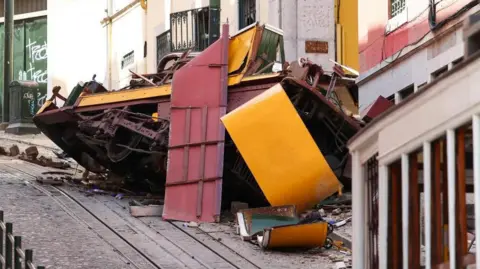 Reuters
ReutersThree British nationals were killed in the Lisbon funicular crash, Portuguese police have said.
The Glória funicular, a popular tourist attraction, derailed and crashed into a building on Wednesday, killing 16.
More than 20 people were also injured, with five in a critical condition.
Nationals of Portugal, South Korea, Switzerland, Canada, Ukraine, France, and the US are also among the dead, police said.
It is not known what caused the crash. The capital's public transport operator, Carris, said all funiculars would be inspected and that it had launched an independent investigation.
The 140-year-old carriage derailed at around 18:15 local time (17:15 GMT) near the city's Avenida da Liberdade boulevard.
More than 60 rescue personnel raced to the scene to pull people from the wreckage.
Videos and images of the site showed an overturned, crumpled yellow carriage lying on the cobblestone street.
Portugal's Prime Minister Luís Montenegro called the crash "one of the biggest human tragedies of our recent history" and a national day of mourning was declared.
This breaking news story is being updated and more details will be published shortly. Please refresh the page for the fullest version.
You can receive Breaking News on a smartphone or tablet via the BBC News App. You can also follow @BBCBreaking on X to get the latest alerts.
Sometimes it's not what's said that makes the biggest impression.
It's the reaction.
In the Russian Far East, Vladimir Putin delivered a warning to the West: don't even think about sending soldiers - and that includes peacekeepers - to Ukraine.
"If some troops appear there," the Russian president said, "especially now while the fighting's going on, we proceed from the premise that these will be legitimate targets for destruction."
Then the reaction.
The audience at the economic forum in Vladivostok burst into applause, with Russian officials and business leaders apparently welcoming the threat to "destroy" Western troops.
Observing the scene in the hall, I found the applause quite chilling.
And this came just a day after Kyiv's allies, the so-called Coalition of the Willing, had pledged a post-war "reassurance force" for Ukraine.

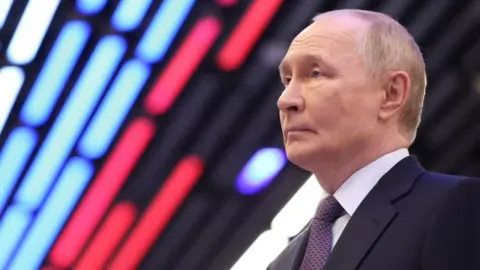 SPUTNIK/KREMLIN POOL/EPA/Shutterstock
SPUTNIK/KREMLIN POOL/EPA/ShutterstockThe audience applauded again when the Kremlin leader suggested that he would be prepared to meet Ukraine's President Volodymyr Zelensky - but only on home soil.
"The best place for this is the Russian capital, in Hero City Moscow," said Putin.
Outside Russia, Putin's proposal has been dismissed as unserious, a complete non-starter. A case of political trolling.
But in many ways it encapsulates the Kremlin's current position on the war in Ukraine: "Yes, we want peace, but only on our terms. You reject our terms? No peace then."
This uncompromising stance is being fuelled by a combination of factors.
First, by the Kremlin's belief that, in Ukraine, Russian forces have the initiative on the battlefield.
Second, by diplomatic success. In China this week, Putin shook hands and shared smiles with a string of world leaders. The optics were all about demonstrating that Russia has powerful friends, such as China, India and North Korea.
And then there's America. Last month US President Donald Trump invited Putin to Alaska for a summit meeting. Back home pro-Kremlin commentators hailed the event as evidence that Western efforts to isolate Russia over the war in Ukraine had failed.
To convince the Kremlin to end the fighting Trump has previously set ultimatums and deadlines; he's threatened further sanctions if Russia won't make peace.
But Trump hasn't followed through on his threats - and that's another reason for Russia's confidence.
Putin publicly praises Trump's peace efforts. And yet he has rejected Trump's ceasefire proposals and shown no desire to make concessions over the war in Ukraine.
So where does that leave prospects for peace?
Putin said recently that he could see "light at the end of the tunnel".
It seems to me that right now Russia on the one hand, and Ukraine and Europe (and to some extent America) on the other are in different tunnels, on different roads, with different destinations.
Ukraine and Europe are focused on ending the fighting, shaping security guarantees for Kyiv and making sure that the Ukrainian army is strong enough post-war to prevent another invasion.
When Putin talks about "light at the end of the tunnel", I believe he imagines a path that leads to a Russian victory in Ukraine, and more widely, to the construction of a new global order that benefits Russia.
In terms of peace, it's hard to see where and when these two very different highways will converge.

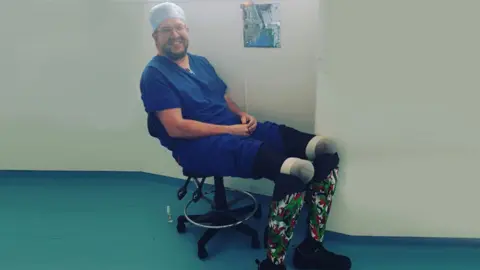 Instagram/Bionicsurgeon
Instagram/BionicsurgeonWhen I interviewed surgeon Neil Hopper in 2023 for BBC News, I believed I was speaking to a man who had been humbled by the life-changing experience of losing his legs to sepsis.
Little did I know, Hopper had a sexual interest in amputation and had frozen his own legs so they would be removed.
Hopper, a consultant vascular surgeon who had carried out hundreds of amputation operations, told me he had come down with a mystery illness on a family camping trip which had led to sepsis and below-knee amputations of both his legs.
In reality, he had used ice and dry ice to freeze his own legs, causing damage that meant they eventually had to be amputated in hospital.
Watching him being jailed on Thursday it was hard to reconcile the reflective man I had interviewed in my capacity as a journalist, with the often graphic details heard in court.
When I interviewed him, I had not doubted the version of events he had told me for one moment. He was a respected surgeon, and why would anyone lie about such a thing?
Warning: Contains information some readers may find upsetting

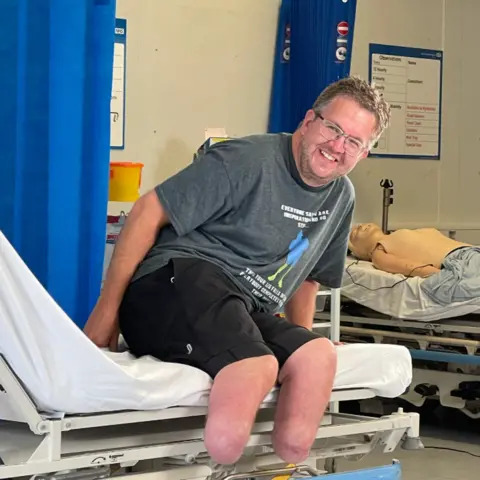 Instagram/Bionicsurgeon
Instagram/BionicsurgeonBack in 2023 Hopper, who grew up in Aberystwyth and Swansea and was living in Truro, Cornwall, appeared almost grateful for the opportunity his life-changing surgery had given him to reassess his life.
"You have to make a lot of sacrifices to be a surgeon and family time is one of them," the father-of-two told me. "I know that was a mistake."
He seemed relaxed, at peace, like a man who had gone through something horrific but had come out the other side changed for the better.
He said losing his legs had led him to "audit" his life and try new things, including applying to become Nasa's first disabled astronaut.
He told me he passed the medical and made it to the final 27 applicants but the space agency eventually selected Paralympic sprinter John McFall.
"My life is more interesting because of what's happened to me," he insisted.
He also praised his wife.
"This didn't happen to me, it happened to us," he said.

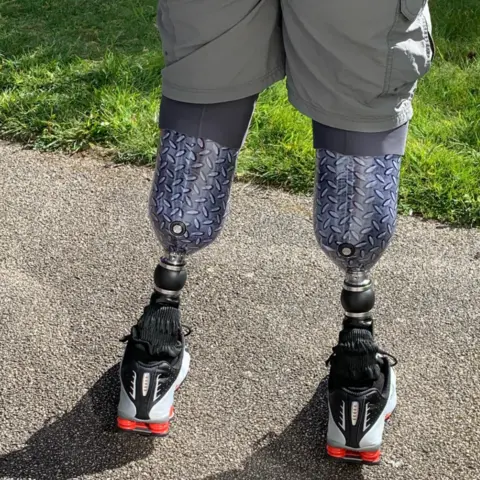 Instagram/Bionicsurgeon
Instagram/BionicsurgeonThe truth behind his amputations was finally laid bare in court on Thursday.
Having his legs amputated was a long-standing ambition for Hopper, the court was told. He had both an obsession and a sexual interest in removing parts of his own body.
The court heard how he had suffered body dysphoria since childhood and his feet were an "unwelcome extra" and a "persisting never-ending discomfort".
For some time, Hopper had been paying to access videos of body mutilation.
The court heard he had bought three videos from the website for £10 and £35, respectively, showing men willingly having their genitals removed.
He also exchanged about 1,500 messages with Marius Gustavson, an amputee who ran the website.
Some of the messages were Hopper seeking advice from Gustavson about how he had brought about his own lower leg amputation.
In one message Hopper told Gustavson: "I've dreamt of this for 20 years."
In another he wrote: "It's going to be awesome being a double amputee."
After his amputations he sent him another message: "It feels so cool. No feet!"

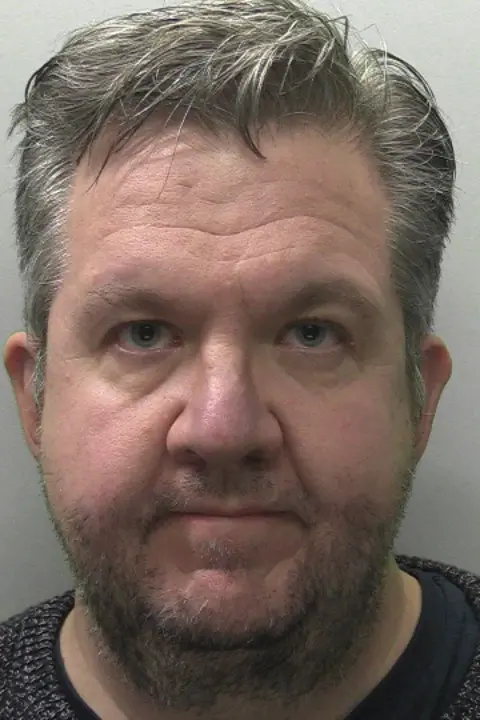 Devon and Cornwall Police
Devon and Cornwall PoliceHopper returned to work for the Royal Cornwall Hospitals NHS Trust just six months after his amputations.
He went on to make fraudulent claims from two insurance firms, lying that the injuries to his legs were the result of sepsis and not self-inflicted.
During this time he messaged a friend to say he felt he should "milk this as much as possible".
The money - totalling more than £466,000 - was quickly spent on luxury items including home improvements, a campervan and a hot tub.
Hopper's unique insight as an amputee who carried out amputation operations, as well as his bid to go into space garnered plenty of media attention.
"He enjoyed the attention that this generated," the court was told.

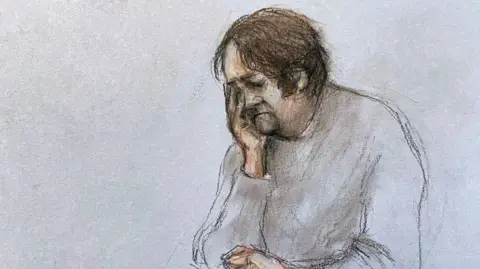 Elizabeth Cook/PA Wire
Elizabeth Cook/PA WireIt was the police investigation into Gustavson that would be Hopper's undoing.
Gustavson was jailed for life in 2024 for leading an extreme body modification ring.
Hopper was arrested in March 2023 and has been suspended from the medical register since December 2023.
On Thursday he was jailed for two years and eight months for insurance fraud and possessing extreme pornography. The court heard Hopper did not regret the operations, but "bitterly regrets" the "dishonesty" about their cause.

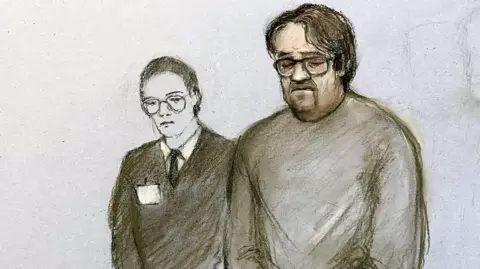 Elizabeth Cook/PA Wire
Elizabeth Cook/PA WireWhen news of the charges against Hopper broke in July, I was shocked.
Then I was confused - what exactly was he accused of doing? And why would someone inflict those injuries on themself?
Then I was concerned. Was I wrong to have taken what he told me at face value?
Fact-checking is an essential part of journalism, but on the face of it this did not appear to be a difficult story to confirm.
I was communicating with Hopper through his place of work, his work as a surgeon was well-documented, and his bilateral amputations were plain to see.
In court Hopper's case was described as "very unique", a "saga" and "difficult to comprehend".
He had managed to pull the wool over the eyes of medics, two insurance companies, and those who knew him - who expressed shock in character references read to the court.
Remembering my conversation with Hopper while watching his sentencing on Thursday, it was clear that as a journalist you never quite know where a story will take you.

 Marianna Massey/Getty Images
Marianna Massey/Getty ImagesLike many Australians, Rach grew up "terrified of the sun" in a country that has the unenviable title of skin cancer capital of the world.
Her childhood was characterised by the infamous "no hat, no play" rule that is commonplace in Australian schools, 90s advertisements that warned the sun would give you cancer, and sunscreen tubes that stood guard at every door in her home.
It made the now 34-year-old the kind of person who religiously applies sunscreen multiple times a day and rarely leaves the house without a hat.
So she was shocked when doctors found a skin cancer on her nose during a check last November, something they said was abnormal given her age and ray-dodging regime.
Though technically classified as a "low grade" skin cancer – a basel cell carcinoma – it had to be surgically removed, leaving the Newcastle mum with a scar just below her eye.
"I was just confused, and I was a little bit angry because I was like, 'Are you kidding me?'" Rach – who asked that her surname not be used – told the BBC. "I thought I'd done all the right stuff and it still happened to me."
That rage grew when she learned the sunscreen she had been using for years was unreliable and, according to some tests, offered next to no sun protection at all.

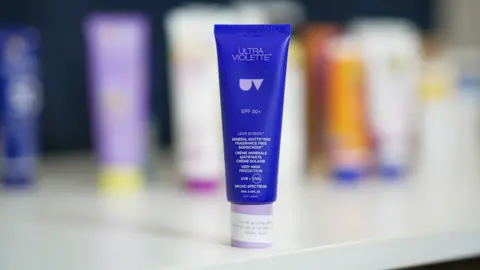 ABC News/Billy Cooper
ABC News/Billy CooperIndependent analysis by a trusted consumer advocacy group has found that several of Australia's most popular, and expensive, sunscreens are not providing the protection they claim to, kicking off a national scandal.
There has been a massive backlash from customers, a probe launched by the country's medical watchdog, multiple products pulled from shelves, and questions raised about the regulation of sunscreen around the globe.
"It's definitely not an issue isolated to Australia," cosmetic chemist Michelle Wong told the BBC.
Australians have a complicated relationship with the sun: they love it, but they also fear it.
Effective public health messaging – which has drilled "Slip, Slop, Slap" into their heads – competes with a beauty culture which often idolises bronzed skin.
The country has the highest incidence of skin cancers in the world and it is estimated that two out of three Australians will have at least one cut out in their lifetime.
So when Choice Australia released its damning report in June, it immediately made waves. The group had tested 20 sunscreens in an independent accredited Australian lab, finding 16 did not meet the SPF, or skin protection factor, rating listed on the packet.
Ultra Violette's Lean Screen SPF 50+ Mattifying Zinc Skinscreen, a facial product that Rach says she used exclusively, was the "most significant failure" identified. It returned a result of SPF 4, something that shocked Choice so much it commissioned a second test that produced a similar reading.
Other products that did not meet their SPF claims included those from Neutrogena, Banana Boat, Bondi Sands and the Cancer Council - but they all rejected Choice's findings and said their own independent testing showed their sunscreens worked as advertised.

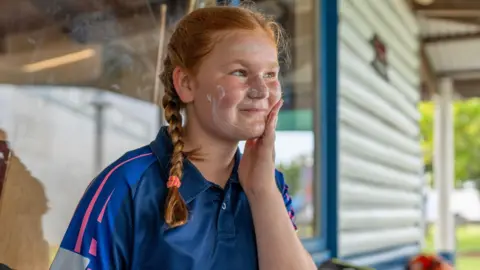 Getty Images
Getty ImagesThe uproar was immediate for the brands named in the report, and also prompted a swift response from the Therapeutic Goods Association (TGA), which said it would investigate the findings and "take regulatory action as required".
Ultra Violette bit back, saying they were "confident that Lean Screen is safe and effective" and detailing extensive testing of the product – which has been sold in almost 30 countries, including the UK, and retails for upwards of A$50 (£24, $33).
But less than two months later, it announced that Lean Screen would be recalled after it returned inconsistent results across eight different sets of lab testing.
"We are deeply sorry that one of our products has fallen short of the standards we pride ourselves on and that you have come to expect of us," read a statement published to the brand's Instagram account.
It added that it has "since ended the relationship with the initial testing lab".
In the past fortnight, other brands have "paused" the sale of at least four more products, none of which were included in the Choice report.
Rach knows there is no way to prove that there is a link between her diagnosis and the brand of sunscreen she relied on. She says she is not alleging there is such a connection.
But she said Ultra Violette's response to the scandal was like "a kick in the guts".
She felt that they took no real accountability for the pitfalls of their product, and was let down by their decision to continue selling it for two months despite doubts over its efficacy.
"I just had like the five stages of grief, you know?" she said. "I was angry, I was upset, I was almost in denial."

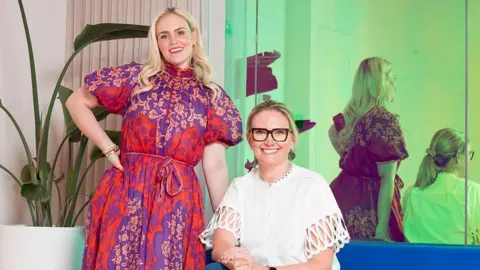 Getty Images
Getty ImagesLike Rach, a horde of annoyed customers say the saga has shaken their faith in the industry.
"A refund isn't really going to reverse years of sun damage, is it?" one wrote in response to Ultra Violette's recall statement.
Choice has urged the TGA to conduct further investigations into the sunscreen market, and also urged any brands who had reason to question the SPF protection listed on their products to remove them from sale immediately.
"It is clear there is a serious issue in the Australian sunscreen industry that urgently needs to be addressed," said Rosie Thomas, the director of campaigns, in a statement to the BBC.
While in Europe sunscreen is classed as a cosmetic, Australia regulates it as a therapeutic good – essentially a medicine – which means it is subject to some of the most robust sunscreen regulations in the world.
And that's something many of the brands caught up in this saga trade on. So, how did this happen?
An investigation by the Australian Broadcasting Corporation found that a single US-based laboratory had certified at least half of the products that had failed Choice's testing, and that this facility routinely recorded high test results.
It also found that several of the sunscreens pulled from shelves shared a similar base formula and linked them to a manufacturer in Western Australia.
The TGA says it does not usually speak about ongoing investigations because it does not want to compromise them, but that it is also looking into "reviewing existing SPF testing requirements" which can be "highly subjective".
"The TGA is also aware that it is common practice for different sunscreen products to share the same or similar base formulations," a spokesperson said in a statement to the BBC.
"Ultimately it is the sponsor's [seller's] responsibility to ensure that their medicine remains compliant with all applicable legislative requirements."
Consistent and comfortable sunscreens which offer high protection are very technical and difficult to make, says Dr Wong, founder of Lab Muffin Beauty Science.
Everyone's skin responds differently to the product, he adds, and it's one that is almost always being stress-tested – by sweat, water, or makeup.
It is very difficult to rate effectively for the same reasons. Historically, it has been done by spreading the sunscreen on 10 people at the same thickness, then timing how long it takes for their skin to start burning both with and without the product applied.

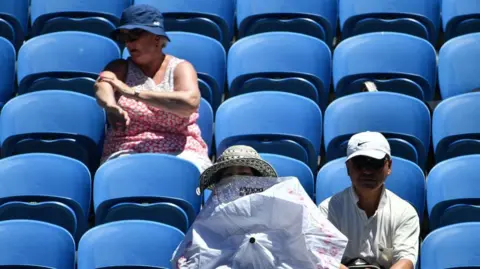 Getty Images
Getty ImagesWhile there are clear guidelines as to what you are looking for, Dr Wong says there is still a lot of variability. That is down to skin texture or tone, or even the colour of the walls, and "different labs get different results".
But she says results are also quite easy to fake, pointing to a 2019 probe by US authorities into a sunscreen testing laboratory which resulted in the owner being jailed for fraud.
Many sunscreen brands from all over the world use the same manufacturers and testing labs - and so this issue is unlikely to be isolated to Australia, she adds.
"Until someone goes out and tests a whole bunch of sunscreens in other countries, we just don't know the extent of it."
She says the scandal is a reminder that regulations are only as good as they are enforced.
But while it has touched a nerve for many people who are at high risk for skin cancer simply by virtue of being Australian, Dr Wong said she felt the panic triggered by the investigation was blown out of proportion.
She points to the world's largest clinical trial of sunscreen, done in the 90s, which found that the daily use of an SPF 16 sunscreen dramatically dropped skin cancer rates.
"95% of the sunscreens tested [by Choice] have high enough SPF to more than half the incidence of skin cancer," Dr Wong said.
"Some of the SPF testing, I feel, has become a bit more of a marketing exercise than a real reflection of efficacy."
The most important thing you can do when choosing a sunscreen, she says, is actually wear enough of it – a full teaspoon at least for each part of your body, face included.
And ideally you should apply it about every two hours, especially if you have been sweating a lot or swimming.
Experts also advise that you combine the sunscreen with other safety methods, such as wearing protective clothing and seeking out shade.
If Republican leaders in Washington had hoped that a month-long congressional recess would help the Jeffrey Epstein controversy die down, this week's frenzy of activity has dashed those hopes - at least for now.
Last Friday, the Justice Department released more than 33,000 pages of documents related to its Epstein investigation into child sex trafficking. By Monday, a consensus had formed that most of the information was already publicly available or of little interest.
Early in the week, Republican Thomas Massie of Kentucky and Democrat Ro Khanna of California resumed their efforts to gather support for a "discharge petition" in the House of Representatives that would force a vote on publicly releasing the entirety of the government's Epstein case information.
On Wednesday, a group of Epstein victims and their families held a press conference on the steps of the Capitol to support the discharge petition and call for full disclosure in the Epstein case.
Taken together, it's the kind of drumbeat of attention that has helped the story break into the larger public's awareness. But will it stay there? Here are possible scenarios for what happens next.

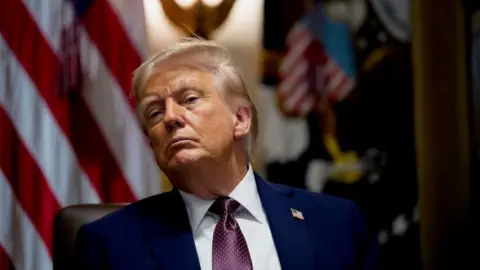 Getty Images
Getty ImagesThe victims' press conference could mark a dramatic turn in the Epstein saga.
Missing from the Washington dialogue, which had focused on client lists and the possible involvement of the rich and powerful, were the faces of those whose lives were damaged or destroyed as children by Epstein's crimes.
The gathering at the Capitol on Wednesday put those victims front and centre - with an added promise that they would not be silenced.
Donald Trump has for months tried to brush off the criticisms of his administration's handling of the Epstein case as a "hoax" perpetrated by his political enemies.
That strategy, while effective in the past, is becoming harder in this case.
And if Massie and Khanna succeed in forcing a House vote to publicly release all remaining Epstein files - and there is new, politically damaging information in them involving Trump or other high-profile political figures - the dam could break.
The White House has denied a Wall Street Journal report that Trump was told in May by his attorney general that his name appeared in files related to the investigations against Epstein, who took his own life in prison awaiting trial.
He was friends with Epstein in the 1990s and early 2000s, but being named is not evidence of any criminal activity. Trump has never been accused by investigators of wrongdoing in connection with the Epstein matter.
Even if there no "client list" of the Epstein's rich and powerful comes to light, the victims may will one into existence. They've promised to gather the names of those they said had close ties to Epstein and were connected to his misdeeds.
"I'm not afraid to name names," said Majorie Taylor Green of Georgia, one of the Republican members of Congress and usually a Trump loyalist. "And so if they want to give me a list, I will walk in that Capitol on the House floor and I'll say every damn name that abused these women."
These are the kind of ingredients that could fan the flames in the Epstein story as summer turns to autumn.
Maybe there's nothing new in any new Epstein-related documents that make it into the public domain. Or maybe the congressional efforts to force public disclosure fall just short. Even with the victims and their families becoming more visible, new revelations or information are what drive news cycles and substantively move public opinion.
In this scenario, the Epstein story doesn't go away completely but it never becomes the kind of crisis that causes lasting political damage to the Trump administration. It is a distraction, not a disruption.
As the Republican Party prepares for midterm congressional elections next year that are shaping up to be closely contested, even a modest drag on their public approval - a diversion that keeps them from focusing on a more beneficial campaign message - could have significant ballot-box consequences.
As Trump pointed out on Tuesday, it's hard to squash a conspiracy theory. He drew parallels to the 1963 assassination of John F Kennedy and his recent orders to release more government documents.
"You know it reminds me a little of the Kennedy situation," he said. "We gave them everything over and over again, more and more and more and nobody is satisfied."
Trump will be more familiar with the recent conspiracy around former President Barack Obama's birthplace. The White House released short- and long-form certificates showing Obama was born on US soil but doubters, most notably Trump himself, were never satisfied.
Turnabout, as they say, is fair play.
If there's one undeniable power that Trump has shown over his 10 years in the national political spotlight, it's the ability to outlast every scandal and controversy that comes his way. While the Epstein story has a toxic blend of power, abuse, sex and influence, there's no indication that this will be any different.
"He's done it before, and he will do it again" is the mantra that a White House looking for a best-case scenario might want to repeat. Without new revelations, the public will eventually tire of this story - or it will be buried by a new scandal, conflict or media frenzy.
If so, the Epstein saga will return to corners of the internet and the political fringes, joining the Kennedy assassination, US moon landing and, yes, Obama's birth certificate as the focus of only an obsessed few.
It may not be justice - it may be too late for that - but it would not be an unfamiliar ending in modern American politics.

 Getty Images
Getty ImagesPresident Donald Trump has warned that, if Venezuelan jets fly over US naval ships and "put us in a dangerous position, they'll be shot down".
His warning comes after Venezuela flew military aircraft near a US vessel off South America for the second time in two days, US officials told the BBC's US partner CBS News.
The reports follow a US strike against what Trump officials said was a "drug-carrying vessel from Venezuela" operated by a gang, killing 11 people.
President Nicolás Maduro has said US allegations about Venezuela are not true and that differences between the countries do not justify a "military conflict".
"Venezuela has always been willing to talk, to engage in dialogue, but we demand respect," he added.
When asked by reporters in the Oval Office on Friday what would happen if Venezuelan jets flew over US vessels again, Trump said Venezuela would be in "trouble".
Trump told his general, standing beside him, that he could do anything he wanted if the situation escalated.
Since his return to office in January, Trump has steadily intensified his anti-drug-trafficking efforts in Latin America.
Maduro has accused the US of seeking "regime change through military threat".
When asked about the comments, Trump said "we're not talking about that", but mentioned what he called a "very strange election" in Venezuela. Maduro was sworn in for his third term in January after a contested election.
Trump went on to say that "drugs are pouring" into the US from Venezuela and that members of Tren de Aragua - a gang proscribed as a terrorist organisation in the US - were living in the US.
The US military has moved to bolster its forces in the southern Caribbean, including through the deployment of additional naval vessels and thousands of US Marines and sailors to stem the flow of drugs.
The White House said on Friday that the US is sending 10 F-35 fighter jets to Puerto Rico.
When asked about the build-up of military assets in the Caribbean, Trump said: "I think it's just strong. We're strong on drugs. We don't want drugs killing our people."
Trump is a long-time critic of Maduro. The US president doubled a reward for information leading to the arrest of the Venezuelan leader to $50m (£37.2m) in August, accusing him of being "one of the largest narco-traffickers in the world".
During Trump's first term, the US government charged Maduro and other high-ranking Venezuelan officials with a range of offences, including narco-terrorism, corruption and drug trafficking.
Maduro has previously rejected the US claims.
It is a sunny spring afternoon in Warwickshire and I'm parked up in a nondescript hatchback with my cameraman, poised to meet a drug dealer.
He has agreed to sell what he claims to be THC vape liquids to a schoolgirl – an illegal substance which is the main psychoactive ingredient in cannabis.
However, we suspect it actually contains spice, a more potent drug that is highly addictive and can cause serious side effects.
And unbeknown to him, the "schoolgirl" is an undercover BBC reporter who has been messaging him on Snapchat.
On Friday we published an article exposing these drug dealers who are selling vape liquid laced with spice to unwitting teenagers through adverts posted on the social media site.
It came after we went undercover to catch the dealers in the act.

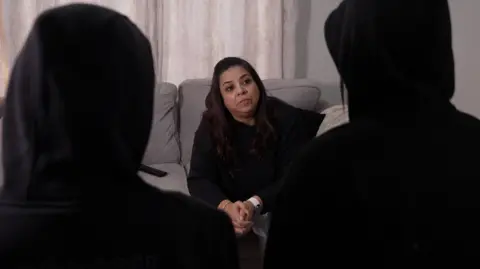
A year ago I saw social media posts from two mums worried about their teenage daughters, who started vaping what they thought was THC when they were just 13.
Over the course of a few months, they told me how the girls had become addicted to what they now suspect was spice, and would come home so high they would collapse.
One said she feared she would find her child dead in their bed, while her daughter said withdrawal symptoms from the drug made her feel like she was "dying".
Both mums want the people responsible to stop. They told us that, despite reaching out to police a year ago, the dealers were still on the streets.
Using the mums' information, we messaged a seller their daughters bought from.

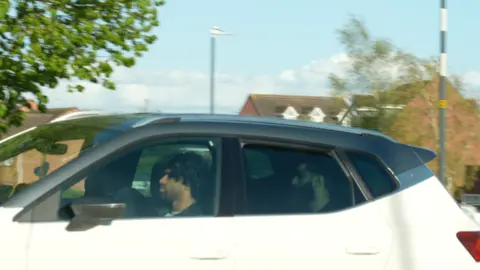
The Snapchat account he's using explains at the top: "new account, old one banned".
Its avatar is a cartoon man standing in front of a wall of dollar bills. I ask for a menu and he sends a brightly-coloured poster with a price list for THC, the chemical compound in cannabis which gets you high.
The price list shows he's charging £10 for a bottle of "special mixed flavour", or £20 for "pure concentrated THC". He delivers on afternoons and evenings across Birmingham and Warwickshire.
It's starting to feel like we're ordering a pizza.
No names or personal information are exchanged but the dealer has a few questions about how we got his information, "So I know you're not police".
We tell him a friend at school recommended him and place an order for three special-mix bottles and one pure concentrated THC. We agree a meet point and ready our team.

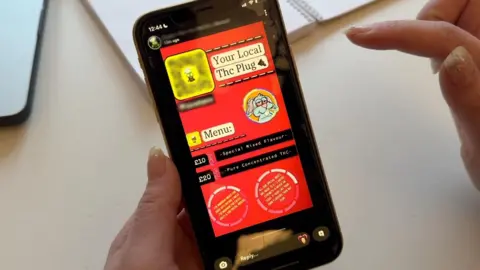
We're waiting on a housing estate in a leafy suburb where most of the houses have perfectly-maintained front lawns and expensive cars on the drives.
The dealer has agreed to meet us near a busy children's playground - which isn't an issue for him.
My colleague is posing as the schoolgirl who placed the vape juice order. She looks like an ordinary teenager, in joggers, worn trainers and a big puffer jacket, clutching her mobile phone and vape.
She's the youngest member of our team and, though the nerves have set in, we all feel confident to carry on.
If at any point she feels unsafe, the whole operation will be pulled. We have to be prepared for the unexpected.
We're in constant communication as she moves to the meeting point, the dealer messaging her his ETA on Snapchat.
Soon, he's five minutes away and things are tense.

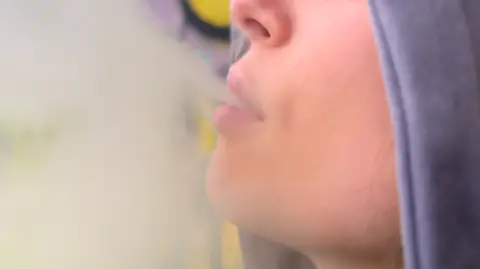
After what feels like a lifetime, a white SUV appears and the adrenaline begins to rush.
There are three of them in the car, which does a U-turn right in front of ours - but we manage to hide our camera.
The team watch as our colleague walks towards the car, our cameras rolling.
After a quick hello, she keeps them talking as she hands over cash, asking about the flavours and whether they would sell in bulk for a party.
The car is slowly rolling forward throughout.
Less than 30 seconds later, she returns clutching four bottles - one turquoise blue, the other three containing clear liquid in 10ml vials. The deal is done.
Independent tests show the bottles we bought contain spice.

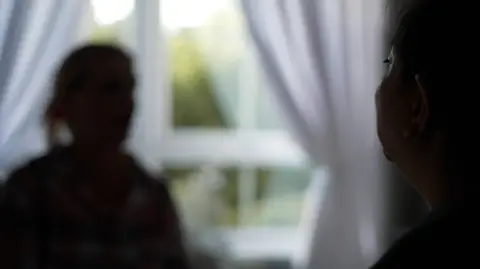
I showed the mums and girls our footage a few days later.
One told me she felt sick. Both are angry the dealers are still active and children like theirs are still buying from them.
And one of the girls recognised the man taking the cash and handing over the drugs, because she'd bought from him before.
We contacted the dealer again last week, using his Snapchat accounts, to see what he had to say. We were blocked and haven't had a reply.
Snapchat has since told us using the platform to buy or sell vapes and illegal drugs is strictly against its rules and that it removed more than more than 2.4 million drug-related posts and disabled 516,000 related accounts last year.
"We use technologies to proactively find and shut down dealers' accounts, block search results for a wide range of drug-related terms and support law enforcement efforts," a spokesperson added.
Warwickshire Police confirmed it had received reports about the spice-laced vapes being sold to young people and said it was working with partners to gather evidence.
Both teenage girls have told us they are no longer vaping illegal drugs.
One mum, Dawn, said: "This stuff's dangerous... for adults and it's highly dangerous for children.
"Adults who are making money out of this are absolute scum. They should be locked up with the key thrown away."
Follow BBC Coventry & Warwickshire on BBC Sounds, Facebook, X and Instagram.

© Millee Tibbs

© Illustration by The New York Times; photograph by Gary Kemp Photography/Getty
Sometimes it's not what's said that makes the biggest impression.
It's the reaction.
In the Russian Far East, Vladimir Putin delivered a warning to the West: don't even think about sending soldiers - and that includes peacekeepers - to Ukraine.
"If some troops appear there," the Russian president said, "especially now while the fighting's going on, we proceed from the premise that these will be legitimate targets for destruction."
Then the reaction.
The audience at the economic forum in Vladivostok burst into applause, with Russian officials and business leaders apparently welcoming the threat to "destroy" Western troops.
Observing the scene in the hall, I found the applause quite chilling.
And this came just a day after Kyiv's allies, the so-called Coalition of the Willing, had pledged a post-war "reassurance force" for Ukraine.

 SPUTNIK/KREMLIN POOL/EPA/Shutterstock
SPUTNIK/KREMLIN POOL/EPA/ShutterstockThe audience applauded again when the Kremlin leader suggested that he would be prepared to meet Ukraine's President Volodymyr Zelensky - but only on home soil.
"The best place for this is the Russian capital, in Hero City Moscow," said Putin.
Outside Russia, Putin's proposal has been dismissed as unserious, a complete non-starter. A case of political trolling.
But in many ways it encapsulates the Kremlin's current position on the war in Ukraine: "Yes, we want peace, but only on our terms. You reject our terms? No peace then."
This uncompromising stance is being fuelled by a combination of factors.
First, by the Kremlin's belief that, in Ukraine, Russian forces have the initiative on the battlefield.
Second, by diplomatic success. In China this week, Putin shook hands and shared smiles with a string of world leaders. The optics were all about demonstrating that Russia has powerful friends, such as China, India and North Korea.
And then there's America. Last month US President Donald Trump invited Putin to Alaska for a summit meeting. Back home pro-Kremlin commentators hailed the event as evidence that Western efforts to isolate Russia over the war in Ukraine had failed.
To convince the Kremlin to end the fighting Trump has previously set ultimatums and deadlines; he's threatened further sanctions if Russia won't make peace.
But Trump hasn't followed through on his threats - and that's another reason for Russia's confidence.
Putin publicly praises Trump's peace efforts. And yet he has rejected Trump's ceasefire proposals and shown no desire to make concessions over the war in Ukraine.
So where does that leave prospects for peace?
Putin said recently that he could see "light at the end of the tunnel".
It seems to me that right now Russia on the one hand, and Ukraine and Europe (and to some extent America) on the other are in different tunnels, on different roads, with different destinations.
Ukraine and Europe are focused on ending the fighting, shaping security guarantees for Kyiv and making sure that the Ukrainian army is strong enough post-war to prevent another invasion.
When Putin talks about "light at the end of the tunnel", I believe he imagines a path that leads to a Russian victory in Ukraine, and more widely, to the construction of a new global order that benefits Russia.
In terms of peace, it's hard to see where and when these two very different highways will converge.
The car workers arrested in one of the largest ever US workplace immigration raids had violated their visitor visas, officials say.
Immigration and Customs Enforcement (ICE) said 475 people, mostly South Korean citizens - were found to be illegally working at a Hyundai battery plant in the US state of Georgia on Thursday.
"People on short-term or recreational visas are not authorized to work in the US," ICE said, adding that the raid was necessary to protect American jobs.
South Korea, whose companies have promised to invest billions of dollars in key US industries in the coming years, partly to avoid tariffs, has sent diplomats to Georgia, and called for its citizens' rights to be respected.
The arrested workers were being held at an ICE facility in Folkston, Georgia, until the agency decides where to move them next.
Of those detained, 300 are reported to be Korean nationals. Hyundai said in a statement that none of them were directly employed by the company.
LG Energy Solution, which operates the plant with Hyundai, told the BBC its top priority was to ensure the safety and wellbeing of its employees and partners and that it "will fully cooperate with the relevant authorities".
In a statement on Friday, the ICE office in the city of Savannah said the raid was "part of an active, ongoing criminal investigation".
"The individuals arrested during the operation were found to be working illegally, in violation of the terms of their visas and/or statuses," the statement added.
But Charles Kuck, an immigration lawyer in Atlanta, told the New York Times that two of his clients were wrongly caught up in the raid.
He told the newspaper the pair were in the US under a visa waiver programme that allows them to travel for tourism or business for up to 90 days.
"My clients were doing exactly what they were allowed to do under the visa waiver - attend business meetings," he said on Friday.
He said one of them only arrived on Tuesday and was due to leave next week.
ICE said one of those detained was a Mexican citizen and green card holder with a lengthy rap sheet.
The individual had previously been convicted of possession of narcotics, attempting to sell a stolen firearm and theft, according to ICE.
Homeland Security Investigations (HSI) Special Agent Steven Schrank said: "We welcome all companies who want to invest in the US.
"And if they need to bring workers in for building or other projects, that's fine - but they need to do it the legal way.
"This operation sends a clear message that those who exploit the system and undermine our workforce will be held accountable."
South Korea's foreign ministry responded to the raid with a statement saying: "The economic activities of Korean investment companies and the rights and interests of Korean citizens must not be unfairly infringed upon during US law enforcement operations."
The raid raises a possible tension between two of President Donald Trump's top priorities - building up manufacturing within the US and cracking down on illegal immigration. It could also put stress on the country's relationship with a key ally.
President Trump said in the Oval Office on Friday: "They were illegal aliens and ICE was just doing its job."
Asked by a reporter about the reaction from Seoul, he said: "Well, we want to get along with other countries, and we want to have a great, stable workforce.
"And we have, as I understand it, a lot of illegal aliens, some not the best of people, but we had a lot of illegal aliens working there."
Trump has worked to bring in major investments from other countries while also levying tariffs he says will give manufacturers incentives to make goods in the US.
The president also campaigned on cracking down on illegal immigration, telling supporters he believed migrants were stealing jobs from Americans.
The factory, which makes new electric vehicles, had been touted by Georgia's Republican governor as the biggest economic development project in the state's history, employing 1,200 people.

 Reuters
ReutersThree British nationals were killed in the Lisbon funicular crash, Portuguese police have said.
The Glória funicular, a popular tourist attraction, derailed and crashed into a building on Wednesday, killing 16.
More than 20 people were also injured, with five in a critical condition.
Nationals of Portugal, South Korea, Switzerland, Canada, Ukraine, France, and the US are also among the dead, police said.
It is not known what caused the crash. The capital's public transport operator, Carris, said all funiculars would be inspected and that it had launched an independent investigation.
The 140-year-old carriage derailed at around 18:15 local time (17:15 GMT) near the city's Avenida da Liberdade boulevard.
More than 60 rescue personnel raced to the scene to pull people from the wreckage.
Videos and images of the site showed an overturned, crumpled yellow carriage lying on the cobblestone street.
Portugal's Prime Minister Luís Montenegro called the crash "one of the biggest human tragedies of our recent history" and a national day of mourning was declared.
This breaking news story is being updated and more details will be published shortly. Please refresh the page for the fullest version.
You can receive Breaking News on a smartphone or tablet via the BBC News App. You can also follow @BBCBreaking on X to get the latest alerts.

 Reuters
ReutersThe Trump administration's effort to strip hundreds of thousands of Venezuelan and Haitian migrants of legal protections is unlawful, a US judge says.
The ruling by District Judge Edward Chen sets aside the Department of Homeland Security's (DHS) attempt to end temporary protected status (TPS) for people from countries experiencing conditions that make it dangerous to return.
It will allow around 600,000 Venezuelans and 500,000 Haitians to continue living and working legally in the US. The DHS has indicated it will appeal the decision.
The TPS program was established by Congress in 1990 to give temporary protections for migrants from countries experiencing war and natural disasters.
In a 69-page decision, Judge Chen wrote that DHS Secretary Kristi Noem's action in revoking their protected status "was not only unprecedented in the manner and speed in which it was taken but also violates the law."
He said conditions in their home countries was "so dangerous that even the State Department advises against travel".
In response to the ruling, a DHS spokesperson told the BBC the scheme had been "abused, exploited, and politicised as a de facto amnesty program", while indicating it would assess its legal options.
"Unelected activist judges cannot stop the will of the American people for a safe and secure homeland," the spokesperson added.
There are about 600,000 migrants who have TPS from Venezuela, the largest country included in the program. Former President Joe Biden extended the program to include Haiti, Afghanistan, Cameroon and Ukraine.
President Donald Trump sought to reverse the extension when he returned to office earlier this year and also attempted to terminate the designation for Venezuela altogether.
In March, the administration, making good on Trump's campaign promise of cracking down on immigration, said it will revoke the temporary legal status of more than half a million migrants from Cuba, Haiti, Nicaragua and Venezuela.
Those migrants were warned to leave the country before their permits and deportation shields were cancelled on 24 April.
The National TPS Alliance and Venezuelan TPS holders sued the Trump administration and DHS earlier this year, arguing that Noem did not have the authority to unilaterally roll back the extension granted by the previous administration.
In May, the Supreme Court froze an earlier ruling and allowed the Trump administration to end the TPS program for hundreds of thousands of Venezuelans.
But Judge Chen, the California federal judge, said in his ruling on Friday that the high court's decision only dealt with preliminary relief he ordered.
It did not preclude him, he wrote, from issuing fresh orders.
Also on Friday, a federal appeals court in Washington DC ruled that the Trump administration cannot continue cuts to foreign aid.
The ruling requires the administration to move quickly to spend funds on projects authorised by Congress.
The administration has withheld $4bn (£3bn) in funding appropriated for the US Agency for International Development, which has been picked apart during Trump's second term.

 NATALIA KOLESNIKOVA/AFP via Getty Images
NATALIA KOLESNIKOVA/AFP via Getty ImagesMarina, a 45-year-old freelance copywriter, has relied on WhatsApp for her work and personal life for years.
But one day last month that abruptly changed when a call to a colleague did not go through properly. They tried Telegram - another messaging app popular in Russia - but that did not work either.
She was one of millions of Russians facing new restrictions imposed in mid-August by Russia's media regulator, Roskomnadzor, on calls made through the two platforms - the country's most popular apps.
The timing coincides with the rollout of a new "national messenger" app known as Max and created by a Russian firm closely controlled by the Kremlin.
Monthly user numbers of WhatsApp and Telegram are estimated to be 97 and 90 million respectively — in a country of 143 million people.
From parents' chats to tenants' groups, much of daily life runs through them. WhatsApp - whose owner, Meta, is designated an extremist organisation in Russia - is especially popular with older people because of how easy it is to register and use.

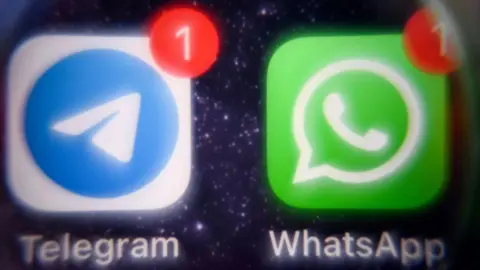 AFP via Getty Images
AFP via Getty ImagesIn some parts of Russia, particularly in remote and sparsely connected places in the Far East, WhatsApp is much more than chatting with friends and colleagues. Mobile browsing is sometimes painfully slow, so people use the app to coordinate local matters, order taxis, buy alcohol, and share news.
Both apps offer end-to-end encryption which means that no third party, not even those who own them, are able to read messages or listen to calls.
Officials say the apps refused to store Russian users' data in the country, as required by law, and they have claimed scammers exploit messaging apps. Yet Central Bank figures show most scams still happen over regular mobile networks.
Telecom experts and many Russians see the crackdown as the government trying to keep an eye on who people talk to and potentially what they say.
"The authorities don't want us, ordinary people, to maintain any kind of relationships, connections, friendships or mutual support. They want everyone to sit quietly in their own corner," says Marina who lives in Tula, a city 180km (110 miles) south of Moscow.
She asked us to change her name, worrying that speaking to foreign media can be dangerous.
The new Max app is being aggressively promoted by pop stars and bloggers, and since 1 September all devices sold in Russia must have Max pre-installed.
It was launched by VK, which owns the country's largest social network of the same name. The Facebook-like platform is controlled by oil-and-gas giant Gazprom and one of Vladimir Putin's closest confidantes, billionaire Yuri Kovalchuk.
Max is set to become a super-app, bringing together multiple functions, including government digital services and banking.
The model mirrors China's WeChat - central to daily life but also a tool of censorship and surveillance.
Max's privacy policy states it can pass information to third parties and government bodies, potentially giving access to the security services or making user data vulnerable to leaks.
In Russia, where people are prosecuted for critical comments or private messages, and a black market of personal data feeds an epidemic of scam calls, this is a real concern.
Although many Russians are worried about the new restrictions on WhatsApp and Telegram, and by the introduction of Max, the state already has vast means to spy on its citizens.

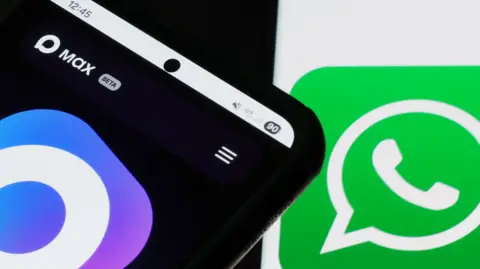 Getty Images
Getty ImagesBy law, you can only buy a sim card with your national ID, and the security services have access to telecom operators' infrastructure. This means they can find out who you call as well as your whereabouts.
From this month it is now illegal to share your sim card with anyone other than a close relative.
But Max can potentially allow the authorities to read your messages as well - and avoiding the app is getting harder.

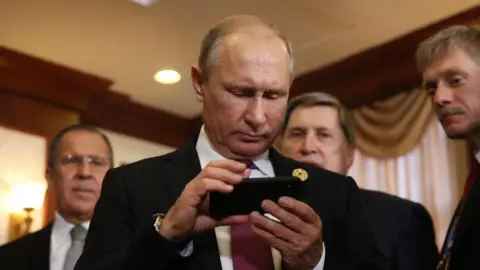 Mikhail Svetlov/Getty Images
Mikhail Svetlov/Getty ImagesSchools are now obliged to move parent chats to the app.
In Rostov region, which borders Ukraine, Max is being adopted as an alert system; in St Petersburg, it is being tied to emergency services.
Despite the push, Max remains far behind its rivals - this week it claimed to have 30 million users.
The Kremlin has long been uneasy of the freedoms offered to people by the internet, which Vladimir Putin once called a CIA project.
The first legislative restrictions came in 2012, soon after mass opposition protests, officially to protect children from suicide-related content.
Ten years later, when Russia launched its full-scale invasion of Ukraine, the government blocked popular social media sites, such as Facebook, Instagram and X, and most independent media, leaving them accessible only through VPNs.
New restrictions keep coming: as of this month, Russians face fines for "deliberately searching" online for extremist materials - more than 5,000 resources from an ever-growing blacklist compiled by the ministry of justice. Examples include a book by opposition leader Alexei Navalny, who died in prison in 2024, and Ukrainian songs.
Another ban targets adverts on platforms linked to "extremist" organisations, in effect ending advertising on Instagram which many small businesses had relied on as a shopfront.
Ads for VPNs are also banned, and while using these apps is not illegal, it may now be treated as an aggravating factor in criminal cases.
Apart from their problems with WhatsApp and Telegram, many Russians are now getting used to life without mobile internet altogether, as entire cities face regular cut-offs.
Since May, every Russian region has seen mobile internet go down.
Blackouts surged through the summer, with up to 77 regions hit by shutdowns simultaneously at the peak, according to the Na Svyazi (In Touch) project.
The authorities justify the measures by the need to protect people and infrastructure from attacks by Ukrainian drones - Kyiv's response to Russia's relentless and deadly bombardments of Ukrainian cities.
But some experts doubt that switching off mobile internet - which many Russians use instead of broadband - is an effective tool against long-distance drone attacks.
Local authorities, who were made responsible for countering drone attacks, have no other means to do it, explains telecom expert Mikhail Klimarev.
"There are no air defence systems, no army - everything's on the frontline," he says. "Their logic goes: we've switched off the internet and there were no drones, hence it works."
In Vladimir, 200km (125 miles) east of Moscow, two of the city's three districts have been offline for almost a month.
"It's impossible to check bus routes or timetables," says Konstantin, a resident who also asked to change his name. "The information boards at stops also show errors."
Taxi fares have risen as drivers cannot accept orders online.
State TV in Vladimir spun the shutdown as "digital detox", showing residents who said they now enjoyed more walking, reading and spending time with friends.
In Krasnoyarsk, a city of more than a million people in Siberia, mobile internet vanished citywide for three days in July and still works poorly.
Some officials rejected complaints, with one Krasnoyarsk bureaucrat suggesting remote workers who lost income should "go and work for the special military operation", as the war in Ukraine is known in Russia. She later apologised.
The government is now working on a scheme that will allow Russians to access only vital online services during shutdowns, such as banking, taxis, deliveries - and the Max messenger.
This is a dangerous step, warns Sarkis Darbinyan, lawyer and co-founder of digital rights group RKS Global.
"There's a possibility the authorities will use this measure for other goals apart from fighting drones," he tells the BBC.
He believes the Kremlin's current approach to the internet mirrors Beijing's.
"Unlike the Chinese, Russians have spent decades enjoying cheap, fast internet and foreign platforms," he says. "These services became deeply ingrained not only in people's daily lives but also in business processes."
For now those who are wary of installing Max on their devices can still find a way around it.
Marina from Tula says her mother, a school teacher, was instructed to download the messenger but claimed to her superiors that she didn't have a smartphone.
People can still call each other using regular mobile networks, although that is more expensive, especially when talking to someone abroad - and not secure.
There are other means available too, like using VPNs or alternative messaging apps, previously reserved for tech nerds and those handling sensitive information.
But as government control over the internet increases, fewer and fewer people will find ways to escape it - and that is assuming the internet is still available for them to try.
Additional reporting by Yaroslava Kiryukhina